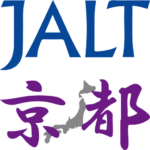Events
JSPS Kaken Grants Symposium-Questions, Strategies, and Experiences
 Kyoto chapter is looking for 4-5 symposium discussants who have experience applying, successfully or unsuccessfully, for JSPS Kaken Grants (kakenhi) and can speak on one or more of the following topics: Proposals due 30 November, 2024
Kyoto chapter is looking for 4-5 symposium discussants who have experience applying, successfully or unsuccessfully, for JSPS Kaken Grants (kakenhi) and can speak on one or more of the following topics: Proposals due 30 November, 2024
Fostering an Intercultural Mindset in Foreign Language Classrooms with Dr. Ana Sofia Hofmeyr & The Kyoto Chapter Annual General Meeting – video and slideshow AVAILABLE!
 The AGM is an opportunity to learn about what the Kyoto Chapter of JALT has been doing in 2024 and what we will be doing in 2025 to support your professional development. You can also meet your 2024-2025 officers and learn how you can get involved our efforts.
The AGM is an opportunity to learn about what the Kyoto Chapter of JALT has been doing in 2024 and what we will be doing in 2025 to support your professional development. You can also meet your 2024-2025 officers and learn how you can get involved our efforts.
この総会では、京都JALT支部が2024年に行った活動や、2025年における皆様のプロフェッショナルな成長をサポートするための計画について学ぶ機会を提供します。2024-2025年度の役員との顔合わせや、活動に参加する方法についても知ることができます。
Integrating AI into language learning: Exploring the issues / AIを語学学習に統合する: 課題の探求 – 8 December via Google Meet
 Discover how AI is reshaping language education in these thought-provoking presentations, each offering a unique perspective on integrating AI into the classroom. From exploring how tools like ChatGPT can support self-directed learning and empower both students and teachers, to investigating the use of AI as a feedback partner in writing education, these sessions shed light on the evolving relationship between technology and learning. Attendees will also gain insight into the broader implications of AI in English Language Teaching, examining its role as a valuable resource, a disruptive force, and a potential threat to academic integrity.
Discover how AI is reshaping language education in these thought-provoking presentations, each offering a unique perspective on integrating AI into the classroom. From exploring how tools like ChatGPT can support self-directed learning and empower both students and teachers, to investigating the use of AI as a feedback partner in writing education, these sessions shed light on the evolving relationship between technology and learning. Attendees will also gain insight into the broader implications of AI in English Language Teaching, examining its role as a valuable resource, a disruptive force, and a potential threat to academic integrity.
こちらの刺激的なプレゼンテーションでは、AIがどのように語学教育を変革しているかを探ります。ChatGPTのようなツールが自己学習を支援し、生徒と教師の両方に力を与える方法から、AIをライティング教育でのフィードバックパートナーとして活用する取り組みまで、テクノロジーと学習の進化する関係に焦点を当てています。また、AIが英語教育に与える広範な影響についても議論し、貴重なリソースでありながら、学びの現場における混乱や学問の誠実性に対する脅威となり得る側面も考察します。
Community Spotlight – Gerry Yokota, 28 September (Video Available)
 Too often I hear students complaining that their freedom of speech is being suppressed. I propose a community discussion sharing our sense of the atmosphere on our campuses. Is there robust exchange of views on controversial issues, or is there a sense that risky issues are taboo? Isn’t support for freedom of speech on campus essential for educating global citizens who are capable of expressing their views? If they do not get this practice now, how will they be prepared to deal with controversy in the real world after graduation? What is the best way to support them?
Too often I hear students complaining that their freedom of speech is being suppressed. I propose a community discussion sharing our sense of the atmosphere on our campuses. Is there robust exchange of views on controversial issues, or is there a sense that risky issues are taboo? Isn’t support for freedom of speech on campus essential for educating global citizens who are capable of expressing their views? If they do not get this practice now, how will they be prepared to deal with controversy in the real world after graduation? What is the best way to support them?
Multimodality and Multiliteracies in Language Teaching and Learning – 8 September, 2024 @13:00 via Google Meet
 All meaning is multimodal and so our students must be multiliterate, but how do multimodality and multiliteracies fit in our teaching? Join the discussion for necessary background and examinations of contemporary teaching from around East Asia at this free online event.
All meaning is multimodal and so our students must be multiliterate, but how do multimodality and multiliteracies fit in our teaching? Join the discussion for necessary background and examinations of contemporary teaching from around East Asia at this free online event.
